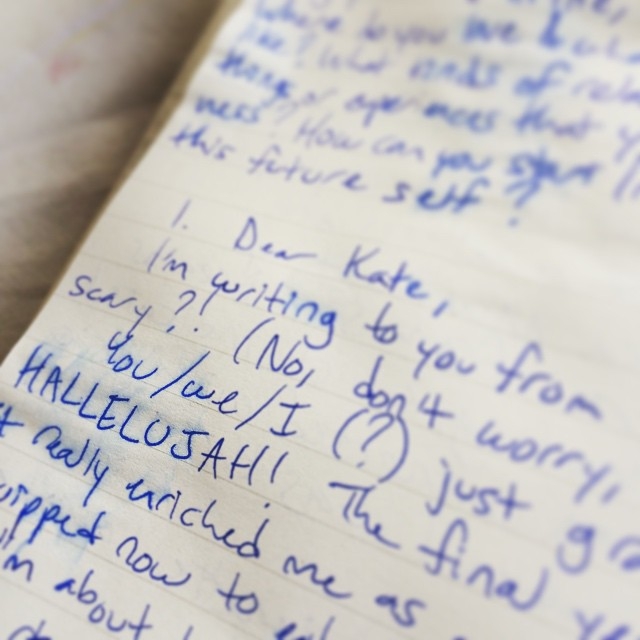
You may have noticed that I write a lot of personal stuff. Stuff about my sex life. Stuff about my relationships. Even stuff about my childhood.
Friends reading my work often remark that I “must have a good memory” because I’m able to recall surprisingly specific details – like the exact wording of something a partner said to me, the exact outfit I wore to a particular event, or the exact number of seconds that elapsed between text messages.
It is probably true that I have a better-than-average memory for romantic and sexual events, developed due to a combination of obsessive anxiety, an intense passion for this subject matter, and plain ol’ practice. But I also have plenty of tricks up my sleeve that help me remember details when my brain didn’t cling onto them to begin with. Here are a few resources I rely on, that you might also find useful for your personal writing…
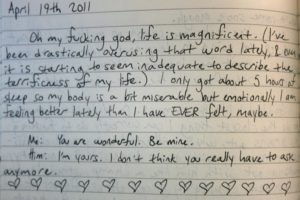 Journal entries. I’ve journaled regularly for over 10 years, as a means of coping with feelings, processing events, and identifying patterns. My journals aren’t exhaustive – I don’t write down every single thing I did on a given day, just what felt emotionally significant to me that day – so they’re not always good for cross-referencing minute details, but they are a good record of big emotional arcs in my life.
Journal entries. I’ve journaled regularly for over 10 years, as a means of coping with feelings, processing events, and identifying patterns. My journals aren’t exhaustive – I don’t write down every single thing I did on a given day, just what felt emotionally significant to me that day – so they’re not always good for cross-referencing minute details, but they are a good record of big emotional arcs in my life.
For example, the last time I thought I might be falling in love, I went back and looked at old journal entries from previous times I’d fallen in love. I wanted to check if the “symptoms” were similar, if the timelines matched up, etc. to see if my present-day feelings were really love or more like infatuation. Nerdy, right?
My journal entries tend to contain the details that really stood out to me about a particular event – so, maybe I don’t write down the name of the specific cocktail I drank on a great date, but I am likely to record stuff like how nervous I felt, what my date’s eyes looked like, and what they wore (if I liked their outfit!). These are all useful pieces of information for a blog post or essay later on.
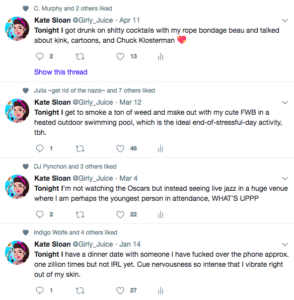 The “advanced search” functions on Twitter and Flickr. Searching your tweets or your backlog of images is a breeze with these two services. I tweet and take photos far more often and more exhaustively than I journal, so I’ll often search my tweets or photos if I need a small, specific piece of information.
The “advanced search” functions on Twitter and Flickr. Searching your tweets or your backlog of images is a breeze with these two services. I tweet and take photos far more often and more exhaustively than I journal, so I’ll often search my tweets or photos if I need a small, specific piece of information.
For example, if I know I tweeted 5 minutes before a date started and then again as I was leaving the date’s house later that night, I can check the timestamps on the tweets to figure out how long we were together. I often refer to Flickr if I need to know what I was wearing on a particular day, or other visual details like what a place looked like or what lipstick I wore.
If you use Google Chrome, you can set up custom search engines to make this process even quicker. I have the short-codes “TWT” and “FLI” set up in my Chrome for Twitter and Flickr, respectively. So if I want to find a tweet of mine containing the word “party,” say, I can just type “twt party” into my address bar and hit enter – or if I want to find a Flickr photo where I was carrying my Kate Spade purse, I can type “fli Kate Spade.” It makes information-hunting much more efficient, so I don’t lose the momentum of my writing!
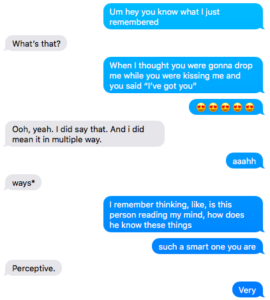 Text message histories. The availability of this technique depends largely on your texting medium of choice. For example, Facebook Messenger’s search function is pretty good, while the Signal app doesn’t have a search function at all (and you lose all your texts if you delete the app!). iMessage’s built-in search function is pretty terrible – it’ll only show you one result for whatever word or phrase you enter – but can work if your search term is specific and unique enough. (e.g. I had no trouble finding the conversation I wanted to find when it contained the phrase “Daddy, per se.”)
Text message histories. The availability of this technique depends largely on your texting medium of choice. For example, Facebook Messenger’s search function is pretty good, while the Signal app doesn’t have a search function at all (and you lose all your texts if you delete the app!). iMessage’s built-in search function is pretty terrible – it’ll only show you one result for whatever word or phrase you enter – but can work if your search term is specific and unique enough. (e.g. I had no trouble finding the conversation I wanted to find when it contained the phrase “Daddy, per se.”)
If you are the type of person who texts a close friend (or a partner) immediately after anything notable happens, texts can be a great source for your initial impressions of events. For example, when I journaled about my first time having sex with a new partner in summer 2017, I wrote at length about how romantic and beautiful the encounter was… but my texts to Bex immediately upon leaving that date tell a slightly different story: “HE IS SUCH A DOMLY SERVICE TOP AND HIS DICK IS ASTONISHINGLY GOOD!!”
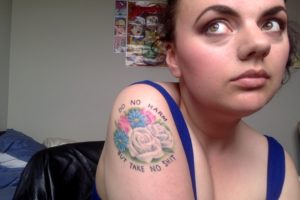 Selfies. Like many millennials, I take a lot of selfies. The timestamps on them can often provide useful information if I’m writing about a particular day/event, and I also like to check what I was wearing incase that’s a detail I want to mention.
Selfies. Like many millennials, I take a lot of selfies. The timestamps on them can often provide useful information if I’m writing about a particular day/event, and I also like to check what I was wearing incase that’s a detail I want to mention.
Occasionally I plumb the depths of my selfies folder when I need more subtle info, like “How long did that boob bruise last?” or “How much did that blowjob smear my lipstick?”
My sex spreadsheet. Every year since 2016, I’ve debated whether I really need to keep a sex spreadsheet for another year, and I always come to the same conclusion: yes I do, because it’s indispensable when I’m writing about sexual encounters.
My journals, texts, and tweets only contain what felt significant to me at the time; they don’t always contain the logistical facts I might need when writing about a sexual interlude down the line, like “How many orgasms did I have on May 8th, 2017?” or “How many blowjobs did I give in October of last year?” or “What sex toys did I use most with partners last summer?” You never know what kinds of details you might want to reference in a piece of writing, so I like having the flat facts at my fingertips incase I need ’em.
What do you refer to when you’re writing about the past?